This site is supported by our readers. We may earn a commission, at no cost to you, if you purchase through links.

Start with scalp massages to boost blood flow—just five minutes daily works wonders.
Rosemary oil isn’t just for cooking; it’s clinically proven to match minoxidil’s effectiveness.
Your diet matters too: protein, omega-3s, and proper hydration fuel follicles from within.
Skip the heat styling when possible, and never underestimate stress management—chronic stress literally shrinks hair follicles.
These aren’t quick fixes, but consistent application transforms your hair game.
The real magic happens when you combine these methods strategically, creating a personalized routine that addresses your specific needs.
Table Of Contents
Key Takeaways
- Massage your scalp daily – You’ll boost blood flow to hair follicles with just 5 minutes of gentle circular pressure using your fingertips, creating the foundation for healthy growth.
- Apply rosemary oil regularly – You can match minoxidil’s effectiveness naturally by mixing 5 drops with a carrier oil and massaging it into your scalp to stimulate follicles.
- Eat protein and omega-3s consistently – You’ll fuel keratin production and strengthen strands from within by including eggs, fish, and lean meats in your daily diet.
- Manage stress through proven techniques – You’ll prevent cortisol from shrinking hair follicles by practicing 10-15 minutes of daily meditation, yoga, or deep breathing exercises.
Scalp Care Essentials
Your scalp’s health forms the foundation for strong hair growth, much like fertile soil nurtures thriving plants.
These four essential scalp care techniques will boost blood circulation, deliver nutrients to your follicles, and create the ideal environment for healthy hair development.
Massages for Blood Flow
Each morning, dedicate five minutes to scalp massage—this simple ritual transforms your hair’s foundation.
Using circular motions with your fingertips, apply gentle pressure to key pressure points around your hairline and crown.
Transform your scalp with five focused minutes of gentle, circular fingertip pressure—your hair’s daily foundation ritual.
These massage techniques boost blood circulation, delivering oxygen and nutrients directly to hair follicles.
The circulation benefits extend beyond stimulation, creating an ideal environment for hair growth stimulation.
For enhanced results, incorporate oil infusion during your massage.
Frequency matters: consistent daily sessions yield better outcomes than sporadic intensive treatments, emphasizing the importance of consistent daily sessions.
Rosemary Oil Benefits
Rosemary oil acts like a natural hair growth stimulator, delivering powerful benefits through enhanced blood circulation and hair follicle stimulation.
This potent hair growth oil matches minoxidil’s effectiveness while reducing scalp inflammation naturally. A key benefit is its ability to provide anti-inflammatory properties to the scalp.
- Stimulating hair follicles: Increases blood flow to deliver essential nutrients to hair roots
- Rosemary vs Minoxidil: Clinical studies show comparable hair count improvements after six months
- Oil blend recipes: Mix five drops with jojoba or coconut oil for ideal scalp absorption
Exfoliating for Health
Just as you wouldn’t plant seeds in unturned soil, your scalp needs regular exfoliation to thrive.
Scalp exfoliation removes dead skin cells, product buildup, and excess oil that can clog follicles and hinder hair growth.
Use gentle physical scrubs or chemical exfoliants like salicylic acid monthly.
DIY exfoliants made from brown sugar and coconut oil work effectively.
This exfoliation frequency promotes healthy scalp conditions, enhances scalp massage benefits, and creates an ideal environment for hair growth tips to flourish.
To find the right one, consider a scalp exfoliation scrub.
Derma Rolling Techniques
You’ll master this game-changing technique by selecting the right needle size and rolling frequency.
Use 0.5mm needles for hair growth, rolling once weekly in multiple directions across your scalp. This creates micro-channels that boost serum absorption by 40%, while triggering blood circulation and collagen production.
A recent study showed microneedling’s high efficacy in treating androgenetic alopecia.
The controlled micro-injuries stimulate follicle stem cells, promoting natural hair growth with minimal pain and scar reduction.
Natural Hair Remedies
Your kitchen holds powerful hair growth allies that work better than many expensive treatments.
These natural remedies provide essential nutrients, stimulate blood flow, and strengthen follicles without harsh chemicals that can damage your hair, making them natural remedies that promote healthy hair growth through improved blood flow.
Egg Yolk Masks
Your hair deserves the protein boost that egg yolk masks deliver.
These DIY hair treatments pack lecithin benefits, sulfur content, and essential proteins that strengthen each strand.
Mix one egg yolk with honey for a simple hair mask for growth.
Apply weekly for best results—your mask frequency matters for consistent hair growth.
Biotin is also present in egg yolks, contributing to overall hair health.
This protein source nourishes follicles naturally, making it a top choice among DIY recipes for healthier locks, providing a natural way to achieve hair growth and promote overall hair health.
Castor Oil Treatments
Castor oil works like a healing balm for your scalp, thanks to its ricinoleic acid content.
This powerful compound fights scalp inflammation while promoting hair regrowth through increased prostaglandin E2 production.
The oil benefits include antifungal and antibacterial properties that create ideal conditions for hair growth.
Application methods are simple: warm the oil slightly, massage into your scalp using circular motions, and leave overnight for maximum absorption.
Cinnamon-Based Masks
The spice that makes your morning latte special can also awaken sleepy hair follicles.
Cinnamon-based masks stimulate blood circulation, delivering nutrients directly to your scalp.
Mix two tablespoons of cinnamon powder with coconut oil to create a warming treatment. Apply this DIY recipe for 20 minutes, then rinse thoroughly.
The antimicrobial benefits promote scalp health while encouraging new growth.
Keratin-Based Products
Think of protein as your hair’s building blocks. Keratin-based products strengthen strands by replenishing lost protein, reducing breakage that stunts growth.
These hair treatments work like armor for damaged cuticles. Many consumers purchase various keratin products to improve hair health.
Three keratin benefits you’ll love:
- Reduced breakage – stronger hair means longer lengths
- Faster styling – cuts drying time by half
- Smoother texture – less frizz, more shine
Professional keratin treatments last up to six months with proper post-treatment care using sulfate-free products.
Healthy Lifestyle Choices
Your lifestyle choices directly impact your hair’s growth potential, creating the foundation for healthy follicles from within.
The habits you maintain daily – from what you eat to how you manage stress – determine whether your hair thrives or simply survives.
Avoiding Smoking
Every cigarette you smoke is like choking your hair follicles.
Smoking’s impact on circulation problems creates a domino effect, restricting blood flow to your scalp.
This circulation damage limits nutrient absorption, starving hair follicles of essential elements needed for hair growth.
When you quit smoking, you’re making one of the most powerful lifestyle changes for overall wellness and hair health.
Balanced Diet Importance
Your plate becomes your hair’s blueprint.
Nutrient deficiencies sabotage growth, while proper protein intake fuels keratin production.
Hydration effects extend beyond skin to hair follicles.
Vitamin importance can’t be overstated—they’re your hair’s best friends.
Mineral impact shapes strand strength from root to tip.
Dairy consumption’s link to skin issues is also worth noting.
Transform your healthy hair diet with these nutrition essentials:
- Protein powerhouse foods like eggs and fish become your hair’s building blocks
- Vitamin-rich vegetables deliver the nutrients your follicles crave daily
- Iron and zinc sources prevent the heartbreak of thinning strands
- Omega-3 fatty acids create the shine that makes heads turn
Limiting Heat Styling
Heat styling tools damage hair by breaking down the protein structure, leading to dryness, breakage, and stunted growth.
You can protect your hair by using heat-protectant products, choosing low-heat alternatives, and embracing air drying techniques.
Try protective hairstyles and heatless styling tools like silk scrunchies or foam rollers to achieve your desired look without compromising hair health.
Stress Reduction Methods
Chronic stress acts like a thief, stealing essential nutrients from your hair follicles.
When cortisol levels spike, your scalp suffers reduced blood flow, disrupting healthy growth cycles.
Combat this silent saboteur through proven stress reduction techniques:
- Meditation Benefits: Practice 10-15 minutes daily for improved sleep quality
- Yoga Practices: Gentle poses enhance scalp circulation naturally
- Mindfulness Exercises: Deep breathing reduces cortisol production
- Scalp Massage: Combine stress management with healthy scalp stimulation
Dietary Adjustments Matter
Your diet directly affects your hair’s strength, growth rate, and overall appearance.
What you eat today shapes the health of the hair follicles that will produce your strands over the next few months.
Essential Nutrients for Hair
Your hair’s building blocks depend on specific nutrients working together like a well-oiled machine.
Think of vitamins for hair as your follicles’ personal trainers, while minerals and hair health go hand-in-hand. Protein intake fuels keratin production, and healthy fats keep strands flexible.
Without proper nutrition, even the fanciest shampoos won’t help.
| Nutrient Category | Key Players | Hair Benefits |
|---|---|---|
| Vitamins | A, C, D, E, Biotin | Follicle health, collagen production |
| Minerals | Iron, Zinc, Selenium | Strength, growth rate, thickness |
| Proteins & Fats | Keratin precursors, Omega-3s | Structure, shine, flexibility |
Hair growth nutrients work synergistically – hair growth vitamins like biotin for hair need supporting minerals to be effective.
Hair supplements can fill gaps, but whole foods provide the best nutrient absorption for ideal results.
Hydration for Hair Health
Water is your hair’s best friend, working like a natural moisturizer from the inside out.
Dehydration creates brittle, weak strands that break easily, while proper hydration maintains elasticity and shine through improved scalp circulation.
- Aim for 8-10 glasses daily – consistent water intake supports healthy hair follicle function and nutrient delivery
- Use humectant-rich products – ingredients like glycerin and hyaluronic acid attract moisture to your hair shaft
- Eat hydrating foods – watermelon, cucumber, and leafy greens boost overall hair moisture levels naturally
- Monitor your hair porosity – low-porosity hair needs lightweight hydrating products, while high-porosity hair requires heavier moisturizers
- Focus on scalp hydration – a well-moisturized scalp creates the ideal environment for healthy hair growth and reduces dryness
Protein-Rich Foods
Your body builds hair from the ground up using protein as its primary construction material.
Think of keratin production as your hair’s internal scaffolding—without adequate protein intake, you’re basically asking your follicles to build skyscrapers without steel beams.
Include eggs, fish, legumes, and lean meats in your daily meals to supply essential amino acids that fuel healthy hair growth and maintain ideal dietary balance for stronger strands.
Omega-3 Supplements
Think of omega-3s as your hair’s best friend.
These healthy fats fuel stronger strands from within, with studies showing 89.9% of participants experienced reduced hair loss after six months of supplementation.
Hair growth supplements containing EPA and DHA omega fatty acids support follicle health and combat inflammation.
Aim for 2000-3000mg daily from fish oil or algal sources to promote hair growth.
Medical Considerations
Sometimes you need more than home remedies to tackle stubborn hair loss.
Medical interventions can provide targeted solutions when natural approaches aren’t enough, offering evidence-based treatments that work alongside your healthy lifestyle choices, providing a way to address hair loss with medical interventions.
Medication Side Effects
Some medications can sneakily sabotage your hair growth journey.
Common culprits include antihypertensive drugs for blood pressure and cholesterol-lowering statins, which may trigger unexpected shedding.
If you’re taking prescription medications and notice increased hair loss, don’t panic—but don’t ignore it either.
Treatment interactions between hair growth medications like minoxidil or finasteride and other prescriptions can create supplement conflicts, potentially reducing effectiveness or causing unwanted side effects.
Consulting a Dermatologist
When you’re struggling with stubborn hair loss, a dermatologist becomes your detective and guide.
They’ll diagnose alopecia types, examine scalp conditions, and create personalized treatment plans that actually work for your specific situation.
Professional dermatologists offer key advantages:
- Expert alopecia diagnosis – distinguishing between pattern baldness, alopecia areata, and other conditions
- Customized treatment options – combining medications, procedures, and lifestyle changes effectively
- Advanced scalp health assessment – identifying underlying issues you might miss
- Hair restoration expertise – accessing cutting-edge therapies like PRP and prescription treatments.
Hair growth dermatologists use specialized tools and years of training to spot what’s really causing your hair loss, then craft solutions that target the root cause rather than just symptoms.
Topical Minoxidil Usage
When your dermatologist recommends minoxidil, you’re getting a proven hair growth treatment that works by increasing blood flow to follicles.
Apply it twice daily to your scalp, following the exact directions. You’ll likely see initial shedding before new growth appears around month three.
Results peak at 12 months, but consistency is key.
Side effects include scalp irritation and unwanted facial hair growth in some users.
Many users see increased hair density with consistent use, leading to improved overall hair health with proven hair growth treatment.
PRP Therapy Benefits
PRP treatment represents a cutting-edge hair restoration approach that uses your own blood platelets to stimulate follicle regeneration.
Clinical studies show PRP effectiveness increases hair density by 25-33 hairs per cm² within six months.
Your dermatologist typically recommends monthly injection frequency for three sessions, followed by maintenance every six months for long-term results.
Post-PRP care involves avoiding harsh chemicals and heat styling for ideal hair growth outcomes, which is crucial for the hair restoration process.
Frequently Asked Questions (FAQs)
What stimulates healthy hair growth?
Your scalp needs proper circulation through massage, nutrient-rich oils like rosemary and castor, balanced nutrition with protein and vitamins, adequate hydration, and stress management for healthy hair growth.
How do I make my hair grow faster naturally?
Like tending a garden, you’ll nurture your hair’s growth through consistent scalp massage, rosemary oil treatments, and protein-rich nutrition.
Regular trims prevent split ends while gentle handling minimizes breakage for ideal results, which includes using rosemary oil treatments.
What really helps your hair grow?
Your hair grows best when you nourish it from within and outside. Eat protein-rich foods, massage your scalp regularly, use natural oils like rosemary, stay hydrated, and avoid harsh chemicals.
How to trick hair growth?
About 90% of your scalp hair grows simultaneously, averaging 25 cm monthly.
You can’t truly "trick" hair growth, but you can optimize it through scalp massage, rosemary oil, balanced nutrition, and stress management.
What causes sudden hair loss in healthy people?
Several factors can trigger sudden hair loss in otherwise healthy individuals.
You’re likely experiencing telogen effluvium, which occurs when stress, illness, hormonal changes, or certain medications push hair follicles into their resting phase prematurely, leading to a condition that can be caused by stress.
Do hair growth vitamins actually work for everyone?
Studies show 45% of people don’t get enough protein daily for healthy hair growth.
Hair vitamins work best when you’re actually deficient in specific nutrients like iron, zinc, biotin, or vitamins D and A, not universally for everyone, which is why understanding your personal deficiencies is key.
Why does hair stop growing at certain lengths?
Your hair doesn’t actually stop growing at certain lengths. Each follicle has a genetically predetermined growth cycle lasting 2-6 years, then naturally sheds and restarts.
Conclusion
Think of healthy hair growth as tending a garden—you can’t rush nature, but you can create the perfect conditions for flourishing.
These healthy hair growth secrets aren’t magic bullets, but they’re scientifically-backed strategies that work when applied consistently.
Your scalp needs circulation, your follicles need nutrition, and your lifestyle choices matter more than expensive products.
Start with scalp massages and rosemary oil, then build from there.
Results take time, but patience pays off with stronger, healthier hair.
- https://pmc.ncbi.nlm.nih.gov/articles/PMC8647708/
- https://www.openaccessgovernment.org/how-does-our-diet-and-lifestyle-affect-our-hair-growth/172394/
- https://www.health.com/foods-for-hair-growth-7963750
- https://www.healthline.com/nutrition/how-diet-affects-hair-loss
- https://hairskin.com/en/blog/hair-growth-statistics/














